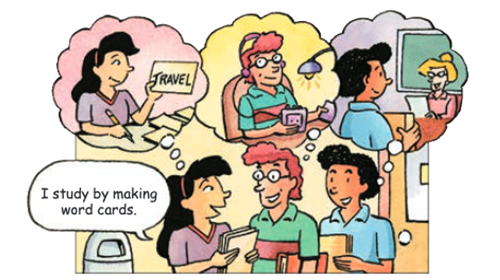九年级|U1 05 Section B 2b
How Can You Become a Successful Learner?
Everyone is born with the ability to learn. But whether or not you can do this well depends on your learning habits. Research shows that successful learners have some good habits in common.
Creating an interest in what they learn
Studies show that if you are interested in something, your brain is more active and it is also easier for you to pay attention to it for a long time. Good learners often connect what they need to learn with something interesting. For example, if they need to learn English and they like music or sports, they can listen to English songs or watch sports programs in English. This way they will not get bored.
Practicing and learning from mistakes
Good learners think about what they are good at and what they need to practice more. Remember, “Use it or lose it.” Even if you learn something well, you will forget it unless you use it. “Practice makes perfect.” Good learners will keep practicing what they have learned, and they are not afraid of making mistakes. Alexander Graham Bell did not invent the telephone overnight. He succeeded by trying many times and learning from his mistakes.
Developing their study skills
It is not enough to just study hard. Good learners know the best way they can study. For example, they may take notes by writing down key words or by drawing mind maps. They also look for ways to review what they have learned. They may do this by reading their notes every day or by explaining the material to another student.
Asking questions
Good learners often ask questions during or after class. They even ask each other and try to find out the answers. Knowledge comes from questioning.
Learning is a lifelong journey because every day brings something new. Everything that you learn becomes a part of you and changes you, so learn wisely and learn well.
参考译文
《如何成为一名成功的学习者?》
每个人生来就具备学习能力。但能否把这件事做好,取决于你的学习习惯。研究表明,成功的学习者都有一些共同的好习惯。
对所学内容产生兴趣
研究显示,如果你对某件事感兴趣,你的大脑会更活跃,也更容易长时间专注于它。优秀的学习者常常会把需要学习的内容和有趣的事物联系起来。例如,如果他们需要学习英语,而又喜欢音乐或体育,就可以听英文歌曲或看英语体育节目。这样一来,他们就不会感到枯燥了。
反复练习并从错误中学习
优秀的学习者会思考自己擅长什么、哪些方面需要多加练习。记住,“不用则废”。即便你把某样东西学得很好,如果不加以运用,也会忘记。“熟能生巧”。优秀的学习者会不断练习所学内容,而且不惧怕犯错。亚历山大・格雷厄姆・贝尔并非一夜之间发明了电话。他是通过无数次尝试、从错误中吸取教训,才最终成功的。
培养学习技巧
仅仅努力学习是不够的。优秀的学习者知道最适合自己的学习方法。比如,他们记笔记时可能会写下关键词,或者画思维导图。他们还会寻找方法复习所学知识,比如每天阅读笔记,或是把所学内容讲解给另一位同学听。
主动提问
优秀的学习者经常在课上或课后提问。他们甚至会互相提问,并努力找到答案。知识源于质疑。
学习是一场终身的旅程,因为每天都会有新的事物出现。你所学的一切都会成为你的一部分,改变你。因此,请明智地学习,好好地学习。
USING DICTIONARIES
This can help you find the definition that matches the context of the word in the text.
挑选字典,尽量挑选带有英英释义的字典,中英字典(尤其有道字典),它有时候并不会把常用释义放在最前面,很容易被误导,相比之下传统字典更会将词频优先的释义放在最前面。查字典时,尽量多看一下例句,看看是否当下语境的释义,是否合适。
Key Words
Key Structures
Self-Test
“学习重要,复习更重要,练习最重要“
结合音频,熟练朗读文章,加深对文章的理解
培养语感,朗读是动用口、眼、耳,多维度的信息摄取,配合动脑视译,快速理解文章。
文章中标记的单词、词组,以及语法点,是否能够识别,并清晰背后知识点
1.【学习金字塔】快速口语造句,用起来;
2.【费曼学习法】将知识点讲给自己或旁人听,是否清晰明白;
回译:研究显示,如果你对某件事感兴趣,你的大脑会更活跃,也更容易长时间专注于它。
Studies show that if you are interested in something, your brain is more active and it is also easier for you to pay attention to it for a long time.
回译:即便你把某样东西学得很好,如果不加以运用,也会忘记。“熟能生巧”。
Even if you learn something well, you will forget it unless you use it. “Practice makes perfect.”
回译:比如,他们记笔记时可能会写下关键词,或者画思维导图。
For example, they may take notes by writing down key words or by drawing mind maps.
回译:你所学的一切都会成为你的一部分,改变你。因此,请明智地学习,好好地学习。
Everything that you learn becomes a part of you and changes you, so learn wisely and learn well.
